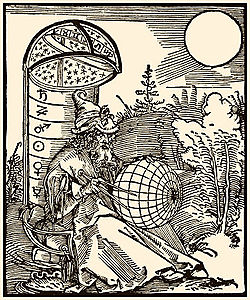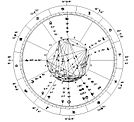- Mashallah ibn Athari
-
 An engraving by Albrecht Dürer, from the title page of the De scientia motus orbis (Latin version with engraving, 1504). As in many medieval illustrations, the drafting compass here is an icon of religion as well as science, in reference to God as the architect of creation.
An engraving by Albrecht Dürer, from the title page of the De scientia motus orbis (Latin version with engraving, 1504). As in many medieval illustrations, the drafting compass here is an icon of religion as well as science, in reference to God as the architect of creation.
Masha'allah ibn Atharī (c.740–815 AD) was an eighth-century Persian Jewish[1] astrologer and astronomer from the city of Basra (now located in modern day Iraq) who became the leading astrologer of the late 8th century.[2] The Arabic phrase ma sha`a allah indicates acceptance of what God has ordained in terms of good or ill fortune that may befall a believer. His real name was probably Manasseh or Jethro[citation needed], and Latin translators named him Messahala (with many variants, as Messahalla, Messala, Macellama, Macelarma, Messahalah). The crater Messala on the Moon is named after him. Science historian Donald Hill writes that Mashallah was originally from Khorasan.[3]
Contents
Life and works
Astrology Background History of astrology Astrology & astronomy Sidereal vs. Tropical Traditions Babylonian · Hellenistic Islamic · Western Hindu · Chinese More... Branches Natal astrology Electional astrology Horary astrology Mundane astrology More... Categories Astrologers Organizations Astrological texts Astrological writers Astrology Portal As a young man he participated in the founding of Baghdad in 762 by working with a group of astrologers led by Naubakht the Persian to pick an electional horoscope for the founding of the city. He wrote over twenty works on astrology, which became authoritative in later centuries at first in the Middle East, and then in the West when horoscopic astrology was transmitted back to Europe beginning in the 12th century.
Mashallah wrote works on Astral sympathies, otherwise known as astrology. Of his over 20 works, few remain. Only one of his writings is still extant in its original Arabic,[4] but there are many medieval Latin,[5] Byzantine Greek[6][7] and Hebrew translations. One of his most popular books in the Middle Ages was the De scientia motus orbis, translated by Gherardo Cremonese (Gerard of Cremona). Mashallah's treatise De mercibus (On Prices) is the oldest extant scientific work in Arabic.[8]
He also wrote treatises on Astrolabes (p 10). The De scientia motus orbis is probably the treatise called in Arabic "the twenty-seventh," printed in Nuremberg in 1501, 1549. The second edition, De elementis et orbibus coelestibus, contains 27 chapters. The De compositione et utilitate astrolabii was included in Gregor Reisch: Margarita phylosophica (ed. pr., Freiburg, 1503; Suter says the text is included in the Basel edition of 1583). Other astronomical and astrological writings are quoted by Suter and Steinsehneider. An Irish astronomical tract also exists based in part on a medieval Latin version. Edited with preface, translation, and glossary, by Afaula Power (Irish Texts Society, vol. 14, 194 p., 1914). The notable 12th century scholar and astrologer Abraham ibn Ezra translated two of Mashallah's astrological treatises into Hebrew: She'elot and Ḳadrut (Steinschneider, "Hebr. Uebers." pp. 600–603). Many of Mashallah's astrologigal treatises were translated out of Latin into English in 2008 and are available in The Works of Sahl and Masha'allah by Benjamin N. Dykes.[9] On Reception, is also available in an English translation by Robert Hand[10] from the Latin edition by Joachim Heller of Nuremberg in 1549.
See also
- List of Iranian scientists
- Jewish views of astrology
- Arab and Persian astrology
Bibliography
- De cogitatione
- Epistola de rebus eclipsium et conjunctionibus planetarum (distinct from De magnis conjunctionibus by Abu Ma'shar al Balkhi ; latin translation : John of Sevilla Hispalenis et Limiensis
- De revolutionibus annorum mundi
- De significationibus planetarum in nativitate
- Liber receptioni
- Works of Sahl and Masha'allah, trans. Benjamin Dykes, Cazimi Press, Golden Valley, MN, 2008.
- Masha'allah, On Reception, trans. Robert Hand, ARHAT Publications, Reston, VA, 1998.
Notes
- ^ Islam and Science, by M. H. Syed, p. 212
- ^ David Pingree: "Māshā'allāh", Dictionary of Scientific Biography 9 (1974), 159–162.
- ^ Donald R. Hill. Islamic Science and Engineering, 1994. p10. ISBN 0-7486-0457-X
- ^ David Pingree: "Māshā'allāh: Greek, Pahlavī, Arabic, and Latin Astrology", in Perspectives arabes et médiévales sur la tradition scientifique et philosophique grecque. Orientalia Lovaniensia Analecta 79. Leuven-Paris 1997. 123–136.
- ^ Lynn Thorndike: "The Latin Translations of Astrological Works by Messahala", Osiris 12 (1956), 49–72.
- ^ David Pingree: "The Byzantine Translations of Māshā'allāh on Interrogational Astrology", in The Occult Sciences in Byzantium. Ed. Paul Magdalino, Maria V. Mavroudi. Geneva 2006. 231–243.
- ^ David Pingree: "From Alexandria to Baghdād to Byzantium: The Transmission of Astrology", International Journal of the Classical Tradition, Summer 2001, 3–37.
- ^ Durant, Will (1950). The Age of Faith: A History of Medieval Civilization – Christian, Islamic, and Judaic – from Constantine to Dante A.D. 325–1300, p. 403. New York: Simon and Schuster
- ^ Benjamin N. Dykes [translator]. Works of Sahl and Masha'allah. Cazimi Press, 2008. [1]
- ^ Robert Hand [translator]. On Reception by Masha'allah. ARHAT (Archive for the Retrieval of Historical Astrological Texts), 1998. [2]
References
- Jewish Encyclopedia – Mashallah
- James Holden, A History of Horoscopic Astrology, American Federation of Astrologers, Tempe, AZ, 1996. ISBN 0-86690-463-8 Pgs. 104–107
- "An Irish Astronomical Tract" translates by unknown, Two-thirds of the tract are part paraphrase and part translation of a Latin version of an Arabic treatise by Messahalah. University College of Cork in Ireland (Coláiste na hOllscoile Corcaigh) An Irish Astronomical Tract
External links
- Belenkiy, Ari (2007). "Māshāʾallāh ibn Atharī (Sāriya)". In Thomas Hockey et al. The Biographical Encyclopedia of Astronomers. New York: Springer. pp. 740–1. ISBN 9780387310220. http://islamsci.mcgill.ca/RASI/BEA/Masha%27allah_ibn_Athari_BEA.htm. (PDF version)
Categories:- 8th-century births
- 810s deaths
- 8th-century astronomers
- 8th-century mathematicians
- Iranian scientists
- Astronomers of medieval Islam
- Medieval Jewish astrologers
- Medieval Jewish astronomers
- People from Basra
- Medieval Persian astrologers
- Medieval Persian astronomers
- Iranian Jews
- Medieval Persian mathematicians
- Medieval Jewish mathematicians
- Mathematicians of medieval Islam
Wikimedia Foundation. 2010.

